Don’t eat dal, you will have gas. Don’t eat rajma, you will get a stomach ache. If you are struggling to manage IBS, these are common statements you must have heard or felt thousand times. However, the question is – what should you eat then? Is dal not good for IBS?
In this blog, let’s try to figure out –
Are dal/ pulses/lentils/ beans good for IBS?
What is going wrong if you have IBS?
What are the pros and cons of having dal in IBS?
How to have dal/ pulses/lentils/ beans if you have IBS?
Which is the best dal for IBS patients?
What do we mean by dal/ pulses/ lentils/ beans? Are these same?
Dal or pulse or lentils or beans belong to the same category as commonly called pulse. These are more or less the same and are being called by different name in a different country.
In India, the pulse category is as follows-
- Various types of dal – moong dal, masoor dal, toor dal, urad dal, chana dal, kulthi, etc.
- Different beans – rajma, chole, chana, peas, soybean, lobia, etc.
- Pulse flour – sattu/ besan
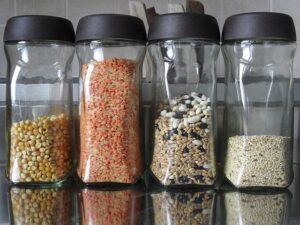
Are dal/pulses good for IBS?
The short answer is yes. You can enjoy dal regularly if you cook dal following a few essential steps. I will get into details later in this blog but first, let’s understand what is going wrong with you in IBS.
What is going wrong with you in IBS?
What is IBS?
IBS or irritable bowel syndrome affects your stomach and intestinal tract and makes them extremely sensitive. You experience unexplained stomach pain, gas, diarrhea, constipation, and sometimes both. Often it is not a serious medical condition. Regular digestive medicines work fine to give you temporary relief. However, the condition is extremely nagging, and irritating and affects your mood, behavior, and quality of life to a large extent.
You eat food. Food reaches the stomach and gets mixed with some digestive enzymes. Then slowly moves forward to the intestine. The intestine is constantly getting contracted and relaxed in a rhythm called peristalsis. This helps food to get mixed with intestinal digestive enzymes and absorb the nutrients and the leftovers to move forward toward the large intestine.
Researchers found that in IBS, the contraction of your colon muscle gets changed which leads you to experience abdominal pain, diarrhea, or constipation.
IBS-D, IBS-C and IBS-M –
The cases where the colon muscle contraction is frequent and intense, leads to passing food faster than its required time to digest, people experience abdominal pain and diarrhea. This condition is commonly known as IBS-D (irritable bowel syndrome with diarrohea)
For a few, the contraction is less than usual which keeps the food in the colon for a longer time. Gut bacteria react to this food and create gas causing stomach pain and constipation. The condition is termed as IBS-C (irritable bowel syndrome with constipation)
Some people experience IBS-C for few days and then may be IBS-D. This condition is called IBS-M (IBS mixed).
The exact reason for IBS is not known till now. However, food and stress are two major reasons to trigger the condition.
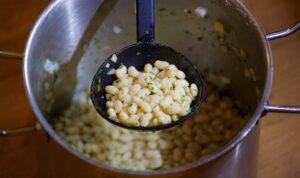
How dal affect IBS?
It has been seen that dal or pulses are not well tolerated for most IBS patients.
Research shows that food containing FODMAP generally triggers IBS. FODMAP stands for fermentable, oligosaccharides, disaccharides, monosaccharides, and polyols. These are short-chain carbohydrates (sugars) that do not get absorbed in the small intestine properly.
Dal or pulses contain highest amount of some oligosaccharides among all the crops. (1) Oligosaccharides like – raffinose, stachyose, ciceritol, verbascose etc are commonly found in dal/ pulses/ legumes/ beans.
Study shows that few oligosaccharides – (galacto- oligosaccharides or GOS)- present in pulses, are not well digested in our body may be due to shortage of specific digestive enzymes. As a result, dal or pulses reach large intestine in partially digested state. Bacteria present in the large intestine ferment these foods and form gas which makes you feel bloated, heavy and uncomfortable. (4)
But dal/pulses are important in daily diet –
Dal in regular Indian diet provides –
- Good amount of protein – important for a vegetarian diet
- Great amount of soluble and insoluble fiber – helpful for IBS patients with constipation
- Satisfactory level of vitamin B complex like thiamine, riboflavin, niacin, pantothenic acid, folate, pyridoxine, etc.
- Good source of minerals such as calcium, phosphorous, zinc, selenium, iron, magnesium
- Decent amounts of antioxidants- polyphenols like procyanidin, flavanols, etc (5)
Table 1: Nutritive value of few common dal/ pulses/ legumes of Indian diet
| Protein (g) | Total dietary fiber (g) | Soluble dietary fiber (g) | Insoluble dietary fibre(g) | Magnesium (mg) | Zinc(mg) | Folic acid (ug) | |
| Masoor (Lentil) | 25.1 | 10.3 | 2.0 | 8.3 | 74 | 3.1 | 36 |
| Moong (Green gram dal) | 24.5 | 8.2 | 1.7 | 6.5 | 122 | 2.8 | 140.0 |
| Toor (Red gram dal) | 22.3 | 9.1 | 2.3 | 6.8 | 90 | 0.9 | 103.0 |
| Urad (Black gram dal) | 24.0 | 11.7 | 4.1 | 7.6 | 130 | 3.0 | 132.0 |
| Chana (Bengal gram whole) | 17.1 | 28.3 | 3.1 | 25.2 | 119 | 6.1 | 186.0 |
| Rajma | 22.9 | 184 | 4.5 | ||||
| Soybean | 43.2 | 175 | 3.4 | 100 |
Source: Nutritive value of Indian Foods, NIN-ICMR,2021
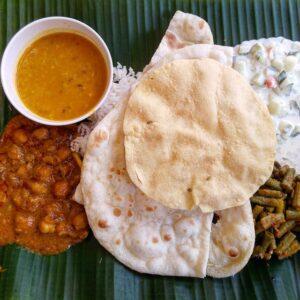
How to make dal safe for IBS patients?
Dal is extremely nutritious and an integral part of common Indian diet. However as mentioned earlier, digesting dal is not easy especially for IBS patients. There is a high chance of bloating, gas, abdominal pain and diarrhoea after dal consumption.
Following proper precooking and cooking method can fix this problem and you may enjoy dal on a daily basis.
Soaking –
Always soak dal for at least 7-8 hrs in excess water before cooking. Discard the water after soaking and wash it thoroughly for 1-2 times.
Soaking helps to reduce the oligosaccharide content to a significant extent. Beside this, pulse also contains anti-nutritional factors like phytate, tannin, trypsin inhibitors, and other enzyme inhibitors on the surface. This pre-treatment helps to reduce the anti-nutritional factors and make the nutrition more available for digestion.
Cooking method –
Avoid cooking dal in a pressure cooker. Try to cook it in an open pot. Cooking helps to leach out oligosaccharide and makes it more suitable for IBS patients. (2) (3)
Once it starts to boil, a white soapy scum starts forming. Scape the scum out 2-3 times. This will help to further reduce the antinutritional factors present in dal.
Seasoning –
Use light seasoning with spices as per your choice. However, avoid using onion, garlic and tomato in the preparation. These are coming under high FODMAP food and usually not well tolerated for IBS patients.
Table 2.3 and 4 showing below how oligosachharide – (raffinose, stachyose, verbacose) content in pulses get reduced after soaking and cooking.
Table 2: Raffinose content (mg/g) of common pulses (3)
| Masoor
|
Chickpeas | Yellow peas | Green Peas | Soybean | |
| Raw | 28.6 | 50.2 | 34 | 30.1 | 60.1
|
| Raw, Soaked for 3 hrs | 24.4 | 29.2 | 30.7 | 24.2 | 40.1 |
| Raw, Soaked for 12 hrs | 21.3 | 15.9 | 28.8 | 7.2 | 26.3 |
| Unsoaked, Cooked | 19.7 | 40.9 | 42.1 | 31.8 | 69.3 |
| Soaked for 3 hrs, Cooked | 3.2 | 17.6 | 42.4 | 22.5 | 36.2 |
| Soaked for 12 hrs, Cooked | 4.0 | 17.3 | 26.3 | 22.3 | 29.6 |
Table 3: Stachyose content (mg/g) of common pulses (3)
| Masoor | Chickpeas | Yellow peas | Green Peas | Soybean | |
| Raw | 24.6 | 27.0 | 31.7 | 35.4 | 35.0 |
| Raw, Soaked for 3 hrs | 21.7 | 16.0 | 22.7 | 28.6 | 18.7 |
| Raw, Soaked for 12 hrs | 24.2 | 8.8 | 17.6 | 23.7 | 15.3 |
| Unsoaked, Cooked | 38.2 | 62.9 | 37.4 | 32.4 | 54.8 |
| Soaked for 3 hrs, Cooked | 11.4 | 25.8 | 35.7 | 22.0 | 29.7 |
| Soaked for 12 hrs, Cooked | 10.4 | 25.6 | 21.1 | 21.6 | 24.3 |
Table 4: Verbacose content (mg/g) of common pulses (3)
| Masoor | Chickpeas | Yellow peas | Green Peas | |
| Raw | 3.9 | 7.2 | 4.9 | 15.0 |
| Raw, Soaked for 3 hrs | 5.0 | 5.7 | 4.1 | 16.6 |
| Raw, Soaked for 12 hrs | 2.6 | 4.4 | 2.9 | 13.4 |
| Unsoaked, Cooked | 13.2 | 20.1 | 15.6 | 57.3 |
| Soaked for 3 hrs, Cooked | 3.5 | 5.1 | 14.3 | 37.8 |
| Soaked for 12 hrs, Cooked | 0 | 4.8 | 10.1 | 33.7 |
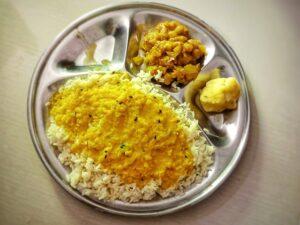
Which dal is best for IBS?
Every human body is different. It has been seen soaking dal well and following the proper cooking method helps IBS patient to digest dal without causing any discomfort. Moong, masoor, toor or urad dal are safe for regular consumption. However, avoid dal with its skin, eg – sabut moong or green moong dal. The high fibre content of green moong or any whole dal may not be suitable for the IBS patient.
It is wise to avoid rajma/ chole/ chana especially when IBS is not under control. Please note, these are very high in fibre and generally need onion, garlic and tomato for the cooking. It is best to limit the consumption like once in a month when IBS symptoms are well under control.
Avoid having sattu or besan items. These are popular pulse flour which are used for various recipes like – chilla, roti, sharbat, pakora, laddu etc. Since soaking or boiling is not possible on flour, avoiding these are the best move.
You can enjoy having sprouts may be twice a week. However, don’t forget to boil the sprouts before eating.
ALSO READ
Step by step Indian diet guide for IBS
Bottom line
Saying no to food is easy but difficult to maintain for a sustainable diet. It is safe to consume dal/pulse/breans/legumes for IBS patients. Feel free to add a variety of pulses to your daily diet. Eat-in moderation and follow the steps for proper preparation and cooking.
You may have a combination of various lifestyle disorders like diabetes, hypertension, high cholesterol, cardiovascular disease, etc along with high uric acid. Consult a nutritionist to plan your diet better. All the best.

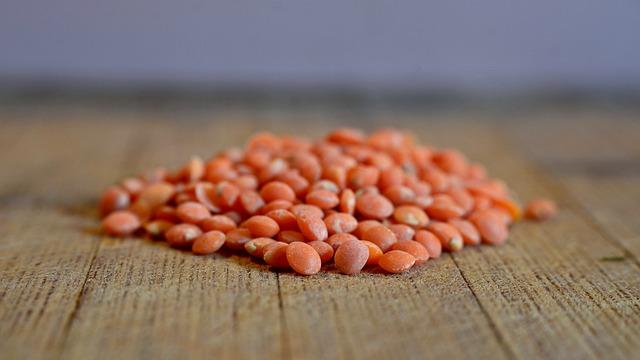
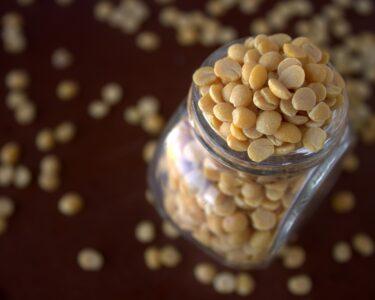

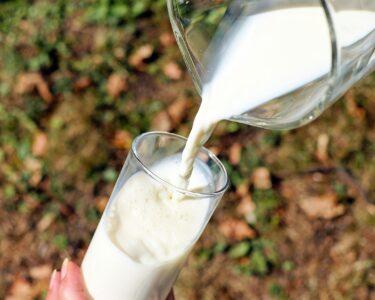
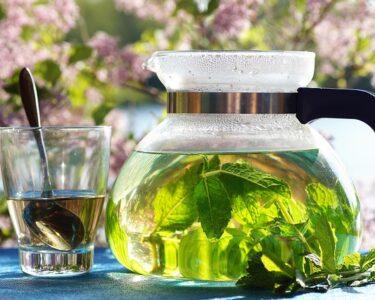
4 Comments